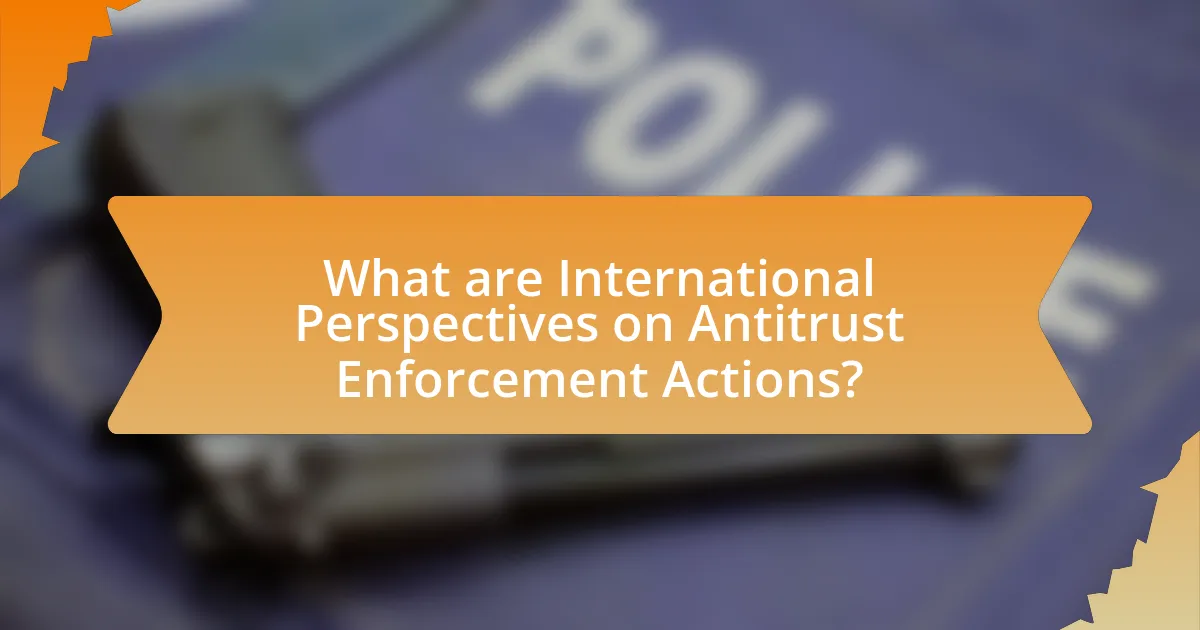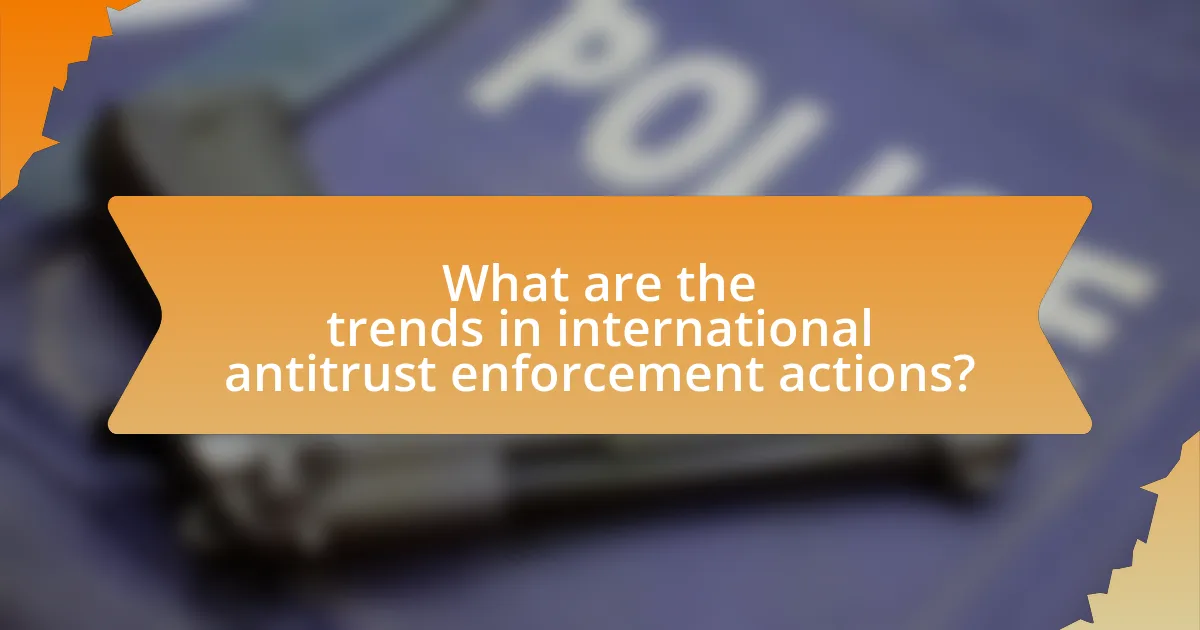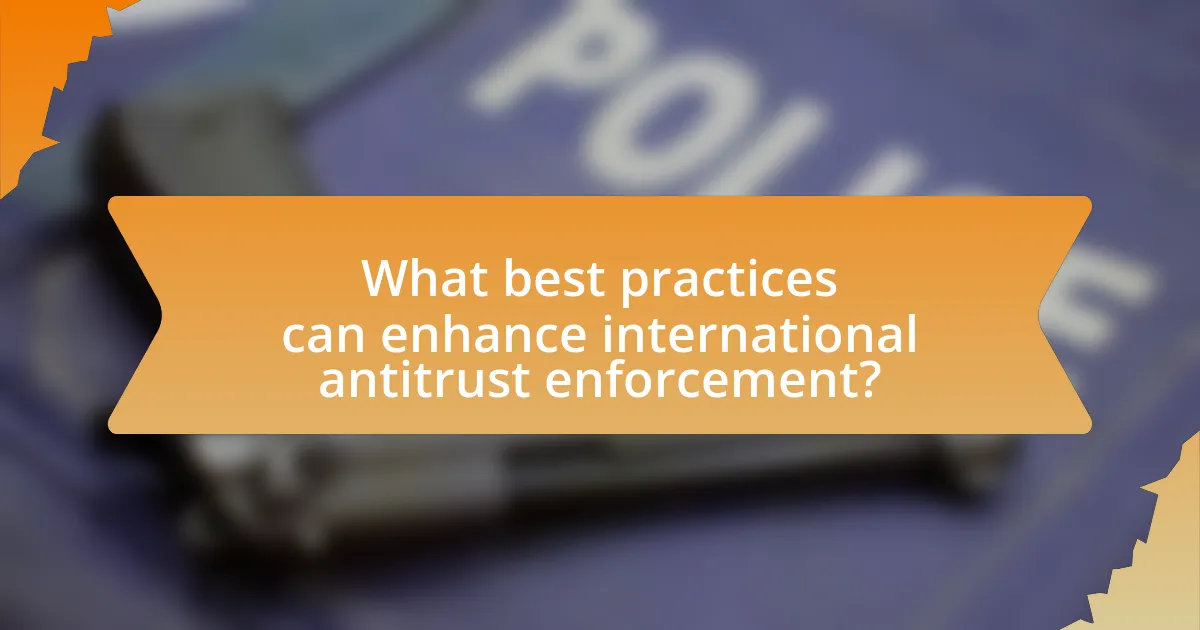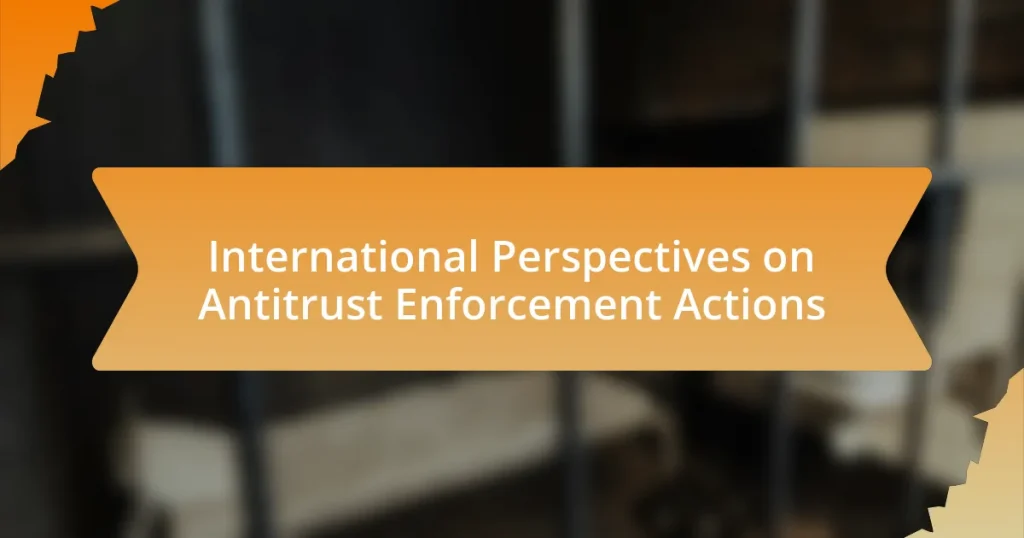The article examines international perspectives on antitrust enforcement actions, highlighting the significant variations across jurisdictions due to differing legal frameworks, economic priorities, and cultural attitudes toward competition. It contrasts the stringent regulatory approach of the European Union with the more lenient stance of the United States, while also addressing the increasing activity of countries like China in antitrust enforcement. Key differences in antitrust laws, the influence of cultural factors, and the importance of international cooperation are discussed, alongside the challenges faced in enforcing these laws globally. The article also explores trends in antitrust enforcement, particularly in digital markets, and outlines best practices for businesses navigating international regulations.

What are International Perspectives on Antitrust Enforcement Actions?
International perspectives on antitrust enforcement actions vary significantly across jurisdictions, reflecting differing legal frameworks, economic priorities, and cultural attitudes toward competition. For instance, the European Union employs a stringent regulatory approach, emphasizing consumer protection and market fairness, as evidenced by high-profile cases like the fines imposed on Google for anti-competitive practices. In contrast, the United States adopts a more lenient stance, focusing primarily on consumer welfare and economic efficiency, which is illustrated by the limited number of antitrust cases pursued against major tech companies compared to Europe. Additionally, countries like China are increasingly active in antitrust enforcement, with a focus on maintaining market order and promoting domestic competition, as seen in their recent actions against large technology firms. These varying approaches highlight the complexities and challenges of global antitrust enforcement, necessitating international cooperation and dialogue to address cross-border competition issues effectively.
How do different countries approach antitrust enforcement?
Different countries approach antitrust enforcement through varying legal frameworks and regulatory practices. For instance, the United States employs a more litigation-focused approach, relying heavily on the Sherman Act and the Clayton Act, which allow for private lawsuits and government actions against anti-competitive practices. In contrast, the European Union utilizes a more regulatory framework, governed by the Treaty on the Functioning of the European Union, which emphasizes preventive measures and fines for violations, as seen in cases like the Google antitrust fines totaling over €8 billion. Additionally, countries like Japan and South Korea have adopted unique approaches, with Japan focusing on a balance between enforcement and economic growth, while South Korea has intensified its enforcement actions in recent years to combat monopolistic practices. These differences reflect each country’s economic priorities and legal traditions in addressing competition issues.
What are the key differences in antitrust laws across various jurisdictions?
Antitrust laws differ significantly across jurisdictions, primarily in their enforcement mechanisms, definitions of anti-competitive behavior, and thresholds for merger approvals. For instance, the United States employs a rule of reason approach, assessing the overall impact of business practices on competition, while the European Union often applies a more stringent per se rule, prohibiting certain practices outright regardless of their effects. Additionally, the U.S. Federal Trade Commission and the Department of Justice have distinct roles in enforcement, whereas the European Commission consolidates these functions. Furthermore, merger thresholds vary; the EU has a higher revenue threshold for mandatory notification compared to the U.S., which can lead to different regulatory outcomes. These differences reflect varying economic philosophies and legal traditions, influencing how competition is maintained in each jurisdiction.
How do cultural factors influence antitrust enforcement in different regions?
Cultural factors significantly influence antitrust enforcement by shaping the priorities and approaches of regulatory bodies in different regions. For instance, in the United States, a competitive market ideology drives antitrust enforcement, focusing on consumer welfare and economic efficiency, as evidenced by the Sherman Act of 1890, which emphasizes preventing monopolistic practices. Conversely, in European Union countries, a more collective approach prioritizes market fairness and social welfare, reflected in the EU’s competition laws that consider the impact of business practices on market structure and consumer choice. Additionally, in countries like Japan, cultural norms around harmony and consensus can lead to a more lenient enforcement of antitrust laws, as seen in the Japan Fair Trade Commission’s historically cautious approach to intervention. These regional differences illustrate how cultural values and societal priorities shape the interpretation and application of antitrust laws.
Why is international cooperation important in antitrust enforcement?
International cooperation is crucial in antitrust enforcement because it enables countries to effectively address anti-competitive practices that transcend national borders. Global markets often involve multinational corporations whose actions can impact competition in multiple jurisdictions simultaneously. For instance, the European Union and the United States have collaborated on various antitrust cases, such as the Microsoft case, to ensure consistent enforcement and prevent regulatory arbitrage. This cooperation helps to harmonize legal standards, share information, and coordinate investigations, ultimately leading to more effective enforcement against anti-competitive behavior.
What role do international organizations play in harmonizing antitrust laws?
International organizations play a crucial role in harmonizing antitrust laws by facilitating cooperation and establishing frameworks for legal standards among member countries. These organizations, such as the Organisation for Economic Co-operation and Development (OECD) and the International Competition Network (ICN), provide platforms for dialogue, share best practices, and promote convergence in antitrust policies. For instance, the OECD’s guidelines on competition policy encourage countries to adopt similar approaches, which helps reduce discrepancies in enforcement and fosters a more predictable international business environment. Additionally, the ICN’s annual conferences and working groups enable competition authorities from different jurisdictions to collaborate on common challenges, thereby enhancing the effectiveness of antitrust enforcement globally.
How can countries collaborate to address cross-border antitrust issues?
Countries can collaborate to address cross-border antitrust issues through the establishment of international agreements and frameworks that facilitate cooperation among antitrust authorities. For instance, the OECD’s Recommendation on Competition Policy encourages member countries to share information and coordinate enforcement actions, which enhances the effectiveness of antitrust measures across borders. Additionally, the International Competition Network (ICN) provides a platform for competition authorities to discuss best practices and harmonize approaches to antitrust enforcement, thereby reducing conflicts and improving outcomes in cross-border cases. These collaborative efforts are essential for addressing the complexities of global markets and ensuring fair competition.
What challenges do countries face in enforcing antitrust laws internationally?
Countries face significant challenges in enforcing antitrust laws internationally due to jurisdictional conflicts, varying legal standards, and the complexities of multinational corporations. Jurisdictional conflicts arise when multiple countries claim authority over the same case, leading to inconsistent enforcement outcomes. Varying legal standards complicate cooperation, as different nations may define anti-competitive behavior differently, making it difficult to align enforcement actions. Additionally, multinational corporations often exploit these differences, engaging in practices that may be legal in one jurisdiction but illegal in another, further complicating enforcement efforts. These challenges hinder effective international collaboration and the overall efficacy of antitrust laws.
What are the common obstacles in jurisdictional conflicts?
Common obstacles in jurisdictional conflicts include differing legal standards, enforcement challenges, and the lack of international cooperation. Differing legal standards arise when countries have varying definitions of antitrust violations, leading to inconsistent enforcement actions. Enforcement challenges occur when authorities face difficulties in applying their laws to foreign entities, often due to limited jurisdiction. The lack of international cooperation complicates cross-border investigations and can result in conflicting rulings, as seen in cases like the Google antitrust investigations, where multiple jurisdictions pursued separate actions based on their own legal frameworks.
How do differing legal standards impact enforcement actions?
Differing legal standards significantly impact enforcement actions by creating variations in how antitrust laws are interpreted and applied across jurisdictions. For instance, the United States employs a “rule of reason” approach, which assesses the overall competitive effects of a business practice, while the European Union often applies a stricter “per se” standard that can lead to quicker enforcement actions against certain anti-competitive behaviors. This divergence can result in inconsistent enforcement outcomes; for example, a merger deemed acceptable in the U.S. might face prohibition in the EU due to differing thresholds for assessing market dominance. Such discrepancies can lead to challenges for multinational corporations navigating compliance, as they must adapt to varying legal expectations and potential penalties in different regions.

What are the trends in international antitrust enforcement actions?
International antitrust enforcement actions are increasingly characterized by heightened cooperation among jurisdictions, a focus on digital markets, and the imposition of significant fines. Regulatory bodies across the globe, such as the European Commission and the U.S. Federal Trade Commission, are collaborating more closely to address cross-border antitrust issues, reflecting a trend towards unified enforcement strategies. Additionally, there is a growing emphasis on regulating technology companies, with authorities scrutinizing practices related to data privacy, market dominance, and anti-competitive behavior. For instance, in 2021, the European Union proposed new regulations targeting digital platforms, indicating a proactive approach to antitrust enforcement in the tech sector. Furthermore, the scale of penalties has escalated, with fines reaching billions of dollars in high-profile cases, underscoring the seriousness with which regulators are addressing anti-competitive practices.
How has globalization affected antitrust enforcement?
Globalization has significantly impacted antitrust enforcement by increasing the complexity of regulating multinational corporations and fostering international cooperation among regulatory bodies. As businesses operate across borders, antitrust authorities face challenges in addressing anti-competitive practices that span multiple jurisdictions. For instance, the European Union and the United States have collaborated on various cases, such as the Microsoft antitrust case, to tackle issues that affect global markets. This collaboration has led to the development of more harmonized standards and practices in antitrust enforcement, as seen in the OECD’s guidelines on competition policy, which encourage member countries to align their enforcement strategies. Consequently, globalization has necessitated a more integrated approach to antitrust enforcement, emphasizing the need for international dialogue and cooperation to effectively address anti-competitive behavior in a globalized economy.
What are the implications of digital markets on antitrust actions globally?
Digital markets significantly influence antitrust actions globally by challenging traditional regulatory frameworks and prompting jurisdictions to adapt their approaches. The rise of major digital platforms, such as Google and Amazon, has led to increased scrutiny over monopolistic practices, as these companies often dominate their respective markets, limiting competition. For instance, the European Union has implemented the Digital Markets Act to address these concerns, aiming to ensure fair competition and prevent abuse of market power. Additionally, the U.S. has seen a resurgence in antitrust litigation against tech giants, with cases like the Federal Trade Commission’s lawsuit against Facebook highlighting the need for updated legal standards. These developments indicate a global trend towards more stringent antitrust enforcement in response to the unique challenges posed by digital markets.
How are emerging economies shaping the future of antitrust enforcement?
Emerging economies are significantly influencing the future of antitrust enforcement by adopting more proactive regulatory frameworks and emphasizing competition policy as a tool for economic development. Countries like Brazil, India, and China have established or strengthened their antitrust authorities, leading to increased scrutiny of monopolistic practices and fostering a more competitive market environment. For instance, India’s Competition Commission has actively intervened in various sectors, including technology and pharmaceuticals, to prevent anti-competitive behavior, reflecting a shift towards more rigorous enforcement. Additionally, the rise of digital markets in these economies has prompted regulators to adapt their approaches, focusing on issues like data privacy and platform dominance, which are increasingly relevant in global antitrust discussions. This evolution in enforcement strategies from emerging economies is reshaping international norms and practices, as they seek to balance economic growth with fair competition.
What recent cases highlight international antitrust enforcement actions?
Recent cases that highlight international antitrust enforcement actions include the European Commission’s fine of €4.34 billion against Google in 2018 for abusing its market dominance in mobile operating systems and the U.S. Department of Justice’s lawsuit against Google in 2020 for antitrust violations related to its search engine practices. These cases exemplify the global trend of regulatory bodies actively pursuing large technology firms for anti-competitive behavior, reflecting a heightened focus on maintaining market fairness and consumer protection across jurisdictions.
What lessons can be learned from landmark international antitrust cases?
Landmark international antitrust cases teach critical lessons about the importance of rigorous enforcement and the need for global cooperation among regulatory bodies. These cases, such as the European Commission’s actions against Microsoft in 2004, highlight how dominant firms can stifle competition, leading to innovation stagnation and consumer harm. The Microsoft case resulted in a fine of €497 million and mandated changes to its business practices, demonstrating that effective penalties can deter anti-competitive behavior. Additionally, the Google antitrust cases in the EU and the U.S. illustrate the necessity of adapting legal frameworks to address new market realities, such as digital platforms’ influence. These cases emphasize the need for transparency in regulatory processes and the importance of balancing enforcement with fostering innovation.
How do these cases reflect the evolving nature of global markets?
These cases reflect the evolving nature of global markets by illustrating how antitrust enforcement adapts to increasing globalization and technological advancements. For instance, the rise of digital platforms has prompted regulators worldwide to reassess traditional competition laws, as seen in the European Union’s actions against major tech companies for anti-competitive practices. This shift demonstrates a recognition that market dynamics are no longer confined to national borders, necessitating international cooperation and harmonization of regulations. Furthermore, the growing emphasis on consumer welfare and market fairness in various jurisdictions highlights a collective effort to address the complexities of modern economies, where monopolistic behaviors can have far-reaching impacts across multiple countries.

What best practices can enhance international antitrust enforcement?
Best practices that can enhance international antitrust enforcement include fostering cooperation among jurisdictions, standardizing legal frameworks, and sharing information effectively. Cooperation among jurisdictions, such as through bilateral agreements, allows for coordinated investigations and enforcement actions, which can address cross-border anti-competitive practices more efficiently. Standardizing legal frameworks helps to reduce discrepancies in antitrust laws, making it easier for companies to comply and for authorities to collaborate. Effective information sharing, facilitated by platforms like the International Competition Network, enables regulators to exchange insights and data, improving the overall enforcement landscape. These practices are supported by examples such as the European Union’s cooperation with the U.S. Department of Justice, which has led to successful joint investigations and outcomes in cases involving multinational corporations.
How can countries improve their antitrust enforcement frameworks?
Countries can improve their antitrust enforcement frameworks by enhancing cooperation among international regulatory bodies. Strengthening collaboration allows for the sharing of best practices and information, which is crucial in addressing cross-border anti-competitive behaviors. For instance, the European Union and the United States have established frameworks for cooperation that facilitate joint investigations and information exchange, leading to more effective enforcement actions. Additionally, countries can invest in training and resources for antitrust authorities to ensure they are equipped to handle complex cases, as seen in jurisdictions like Canada, where ongoing professional development has led to more robust enforcement outcomes.
What role does transparency play in effective antitrust enforcement?
Transparency is crucial for effective antitrust enforcement as it fosters trust and accountability among stakeholders. When regulatory bodies operate transparently, they provide clear information about their processes, decisions, and the rationale behind enforcement actions, which helps to deter anti-competitive behavior. For instance, the European Commission’s commitment to transparency in its investigations allows businesses and the public to understand the criteria used for assessing competition, thereby enhancing compliance and cooperation. Additionally, transparency can lead to better-informed public discourse and policy-making, as stakeholders can engage with the enforcement process based on accurate information.
How can training and resources be optimized for enforcement agencies?
Training and resources for enforcement agencies can be optimized by implementing targeted, data-driven training programs that focus on specific enforcement challenges and by leveraging technology for resource allocation. Tailored training enhances the skills of personnel in areas such as investigation techniques and legal frameworks, which are crucial for effective antitrust enforcement. For instance, the European Competition Network has successfully utilized workshops and seminars to improve the competencies of its members, leading to more effective enforcement actions. Additionally, using data analytics can help agencies identify resource needs and allocate them efficiently, as demonstrated by the Federal Trade Commission’s use of data to prioritize cases based on potential consumer harm. This combination of specialized training and strategic resource management leads to improved enforcement outcomes.
What strategies can businesses adopt to navigate international antitrust laws?
Businesses can adopt several strategies to navigate international antitrust laws effectively. First, they should conduct comprehensive legal audits to understand the antitrust regulations in each jurisdiction where they operate, as laws can vary significantly between countries. For instance, the European Union has stricter regulations compared to the United States, particularly regarding mergers and acquisitions.
Second, companies should implement robust compliance programs that include training for employees on antitrust issues, ensuring that all staff are aware of the legal implications of their actions. This proactive approach can help mitigate risks associated with potential violations.
Third, businesses can engage in regular consultations with legal experts specializing in international antitrust law to stay updated on changes and interpretations of the law. This is crucial as antitrust enforcement can be influenced by political and economic shifts, making expert guidance invaluable.
Lastly, companies should consider establishing clear communication channels with regulatory authorities to foster transparency and cooperation. This can help in addressing concerns before they escalate into formal investigations. By adopting these strategies, businesses can better navigate the complexities of international antitrust laws and reduce the risk of legal challenges.
How can companies ensure compliance with varying antitrust regulations?
Companies can ensure compliance with varying antitrust regulations by implementing robust legal and compliance frameworks tailored to the jurisdictions in which they operate. This involves conducting thorough market analyses to understand local laws, engaging legal experts familiar with specific antitrust regulations, and establishing internal compliance programs that include training for employees on antitrust issues. For instance, the European Union has stringent antitrust laws that differ significantly from those in the United States, necessitating distinct compliance strategies. Additionally, companies can utilize compliance audits and regular reviews to adapt to changes in regulations, ensuring ongoing adherence to legal standards.
What are the best practices for conducting international mergers and acquisitions?
The best practices for conducting international mergers and acquisitions include thorough due diligence, understanding local regulations, and effective integration planning. Conducting comprehensive due diligence ensures that potential risks, including financial, legal, and operational aspects, are identified and addressed. Understanding local regulations is crucial, as different countries have varying antitrust laws and compliance requirements that can impact the merger or acquisition process. Effective integration planning involves aligning corporate cultures, systems, and processes to achieve synergies and maximize value post-transaction. These practices are supported by research indicating that successful international mergers often hinge on meticulous planning and adherence to regulatory frameworks, as highlighted in studies by the Harvard Business Review and McKinsey & Company.



